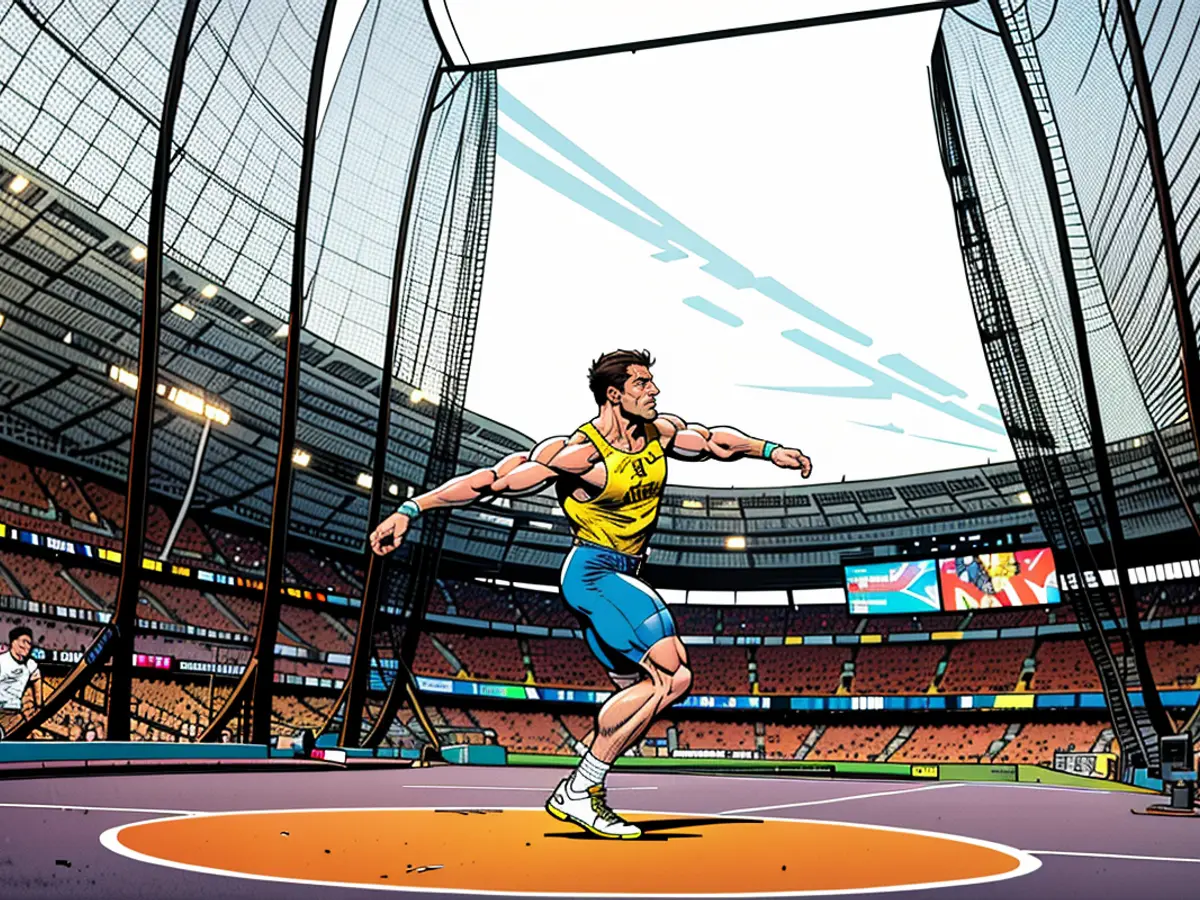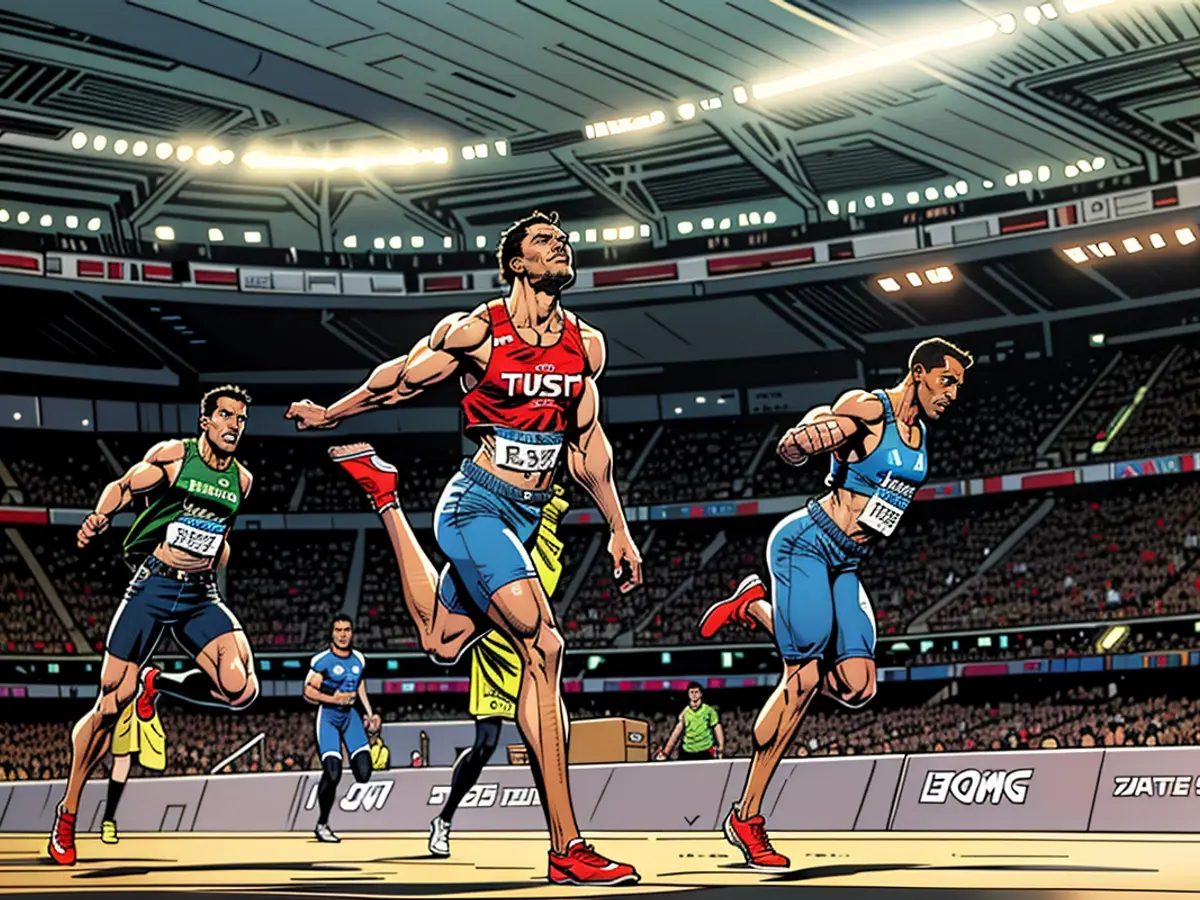Quincy Hall’s incredible charge and 4 other takeaways from a dramatic night of track and field at the Olympics
Here are five takeaways from a thrilling night of track and field:
Quincy Hall’s stunning charge in the 400 meters
It was as wide open a 400-meter race as the Olympics had seen in years. But, judging by his breezy performances in qualifying, American Quincy Hall appeared to be the favorite before the final began.
Running out of lane eight, Hall seemed to barely get out of a jog during qualifying for this race and felt likely to challenge for a new world record.
That didn’t come to pass, but Hall did end up with the gold after a truly incredible effort to hunt down the leaders in the final stretch to take the gold.
A massive roar from the Stade de France crowd came after the gun sounded, as 80,000 watched the first gold medal race of the evening.
Hall trailed through most of the race and was in sixth as the runners came around the final curve. But suddenly he made his move, sprinting into the final straightway. Charging down the stretch, Hall made up ground quickly — the effort written on his face — and he was suddenly passing runners.
“I was just thinking, ‘Get home, sir. Get home, sir,’” Hall said afterward.
In the final meters, Hall overtook Great Britain’s Matthew Hudson-Smith in a thrilling finish, beating the Team GB runner to the line by .04 seconds.
“When it was too late,” Hudson-Smith said of when he knew Hall was coming up behind him. “I thought I had it. We knew coming into this that it was going to come down to the last 50 meters.”
He added, “There’s only going to be one winner. He’s a better man. I can’t complain because I ran the fifth-fastest time overall. I always say, if you want to win, you’ve got to take it from me, and he did. I’m going to lower that time. It’s just the start.”
It was an incredible moment for the American, who ran a personal best and led for only a tenth of a second in the race, leaning across the finish line to take the gold from Hudson-Smith. Zambia’s Muzala Samukonga took the bronze.
Hall rang the victory bell in the northern end of the Stade de France and took off his shoes to pose for a photo. Grabbing Old Glory, he went for a shoeless victory lap around the track to massive cheers.
“This means a lot. I’ve been putting a lot of work in. I told you guys I was going to get a gold medal this year and I guess I just showed you I did it. I know I can win. I knew it today. That’s what I’ve been doing my whole career,” he said. “A lot of work, being hard on myself. I’ve been talking to my coach on the phone, and he just told me, ‘Keep going, keep going.’
“I don’t give up. I just grit, I grind. I’ve got determination. Anything I think will get me to that line, I think of it. A lot of hurt, a lot of pain. I just won. It’s over. For the next four years, I can say I’m an Olympic champion.”
Mykolas Alekna breaks his father’s Olympic record – and still has to settle for silver
The top-ranked discus thrower in the world and the owner of the world record, Mykolas Alekna of Lithuania came into Wednesday the overwhelming favorite to win the gold medal. Beyond that, he had an even bigger aim: beating the Olympic record that his father, Virgilijus Alekna, set at the 2004 Olympic Games in Athens.

On his second throw of the night, Alekna did it, throwing the discus 69.97 meters. It was .08 meters longer than his father’s throw in Athens and now the son looked set to take home the gold medal, the Olympic record and family bragging rights.
He ultimately had to settle for just the bragging rights.
Minutes after Alekna’s record-setting toss, Rojé Stona of Jamaica stepped into the circle and delivered a stunning 70-meter throw to push Alekna into second place – both in Wednesday’s competition and the Olympic history books.
Stona, who finished 19 in last year’s world championships and is ranked No. 11 in the world, was suddenly crashing the Aleknas’ family party here outside Paris.

“It’s a very special night. It’s everything I wanted, but for it to actually happen, it’s a very good feeling,” Stona said. “In practice, leading up to the competition, I felt great. So I believed in myself and I know that I had it in me. Just went and release it, no pressure, I was already in the top eight, so I had nothing to lose.”
He added, “I’ve done some things that I didn’t know I was capable of doing. But I believed, and I had faith, so I was in the moment and I enjoyed it.”
Alekna had a few more attempts at getting his record and his gold medal back but couldn’t get close to his Jamaican counterpart. The stage seemed set for him to seize the moment with his final throw, but a disappointing effort hit the netting, leaving him to have to settle for the silver. Yet the Lithuanian star will only be 25 when LA 2028 rolls around, so expect to see him back on this big stage, looking for gold.
Aussie tops American in a battle of the world’s best in pole vault
It was largely anticipated that the women’s pole vault final would come down to Nina Kennedy of Australia and Katie Moon of the United States.
As the largest women’s pole vault final field ever winnowed from 20 to single digits and then even smaller, the top-ranked pole vaulters in the world seemed to simply fly over the bar. And as their rivals melted away, it was in fact No. 1 Kennedy vs. No. 2 Moon at the end.
Kennedy cleared the 4.90-meter bar with ease on her first attempt. Moon, however, couldn’t do the same. And rather than risk taking failing two more attempts at clearing the 4.90-meter bar, Moon decided to pass on the height and move on to 4.95 meters.

It was a gamble – one that ultimately did not pay off.
By passing on the 4.90-meter bar, Moon only received two chances to clear 4.95 meters instead of the normal three. She failed on her first attempt, as did Kennedy.
The drama was set as Moon needed to clear 4.95 meters on her second attempt and force Kennedy to match her height. If she hit the bar, then she would have to settle for silver and her rival would take the gold.
Moon ran down the runway to the roars of the Stade de France, planted her pole ... and hit the bar. The night belonged to the Aussie.
Kennedy celebrated with her family in the stands and broke into joyous tears over the result. The world’s top-ranked pole vaulter was the favorite going into Wednesday, but she and Moon decided to share the gold medal at last year’s world championship so she knew that it would be close.
“I’ve thought about the Olympic Games every single day since Budapest last year, when Katie and I shared the gold,” she said. “It’s just so amazing that I had so many friends and family and my team (here). We had a job tonight, and we went out there to get it.”
In the end, it was one of the few disappointments for Team USA on Wednesday night.
Three Americans set for men’s 200-meter race
Earlier in the night, three semifinal heats in the men’s 200-meter race set the field for the Thursday night final – and three Americans will be on the starting line.
Noah Lyles, who won the men’s 100-meter race on Sunday, qualified for the final with a second-place finish. It was an eyebrow-raising result given that the 200 meters is Lyles’ signature race, the one in which he won bronze in Tokyo. But the American finished second in both of his qualifying heats before the men’s 100-meter sprint and took gold in that race, so he likely won’t be losing too much sleep over the finish.

Americans won the other two semifinal heats on Wednesday, meaning Team USA will be well-represented in the 200-meter final.
Erriyon Knighton and Kenneth Bednarek both won their races and will compete alongside Lyles at 2:30 p.m. ET Thursday at the Stade de France.
Moroccan charges in the final lap of 3,000m steeplechase to eke out a win over American
Soufiane El Bakkali of Morocco came into the 3,000-meter steeplechase as the top-ranked competitor in the world. He showed exactly why in the final 200 meters of the race that closed the evening at the Stade de France.
For most of the race, the three Ethiopians – Samuel Firewu, Getnet Wale and Lamecha Girma – led the pack. But as the final lap began, American Kenneth Rooks made his move.
Rooks, who is ranked No. 49 in the world in the race, looked for a while like he was about to pull off an absolutely incredible upset. And when Girma tripped on one of the final barriers of the race, landing in a heap on the track and breaking the stride of much of the pack, it seemed like the American was closing in on a famous victory.
But El Bakkali was not to be denied. He charged after the final water obstacle of the race, surging past Rooks in the straightaway and crossing the finish line .36 seconds ahead of the American.
It’s a second gold medal in this event for El Bakkali as he defended the honor he won in Tokyo. But it seemed all the sweeter the second time around – he celebrated with a sizeable contingent of Moroccan fans long after the race had ended and much of the stadium was clear, even going for a dip in the water obstacle in which he made his surge.
After securing the gold medal in the 400 meters, Quincy Hall expressed his excitement about his victory, stating, "I've been putting a lot of work in. I told you guys I was going to get a gold medal this year and I guess I just showed you I did it." Furthermore, the Olympics saw a significant moment in the discus throw event when Roje Stona of Jamaica broke the Olympic record set by his father, Virgilijus Alekna from Lithuania. Despite setting a new world record earlier in the competition, Mykolas Alekna had to settle for second place.









